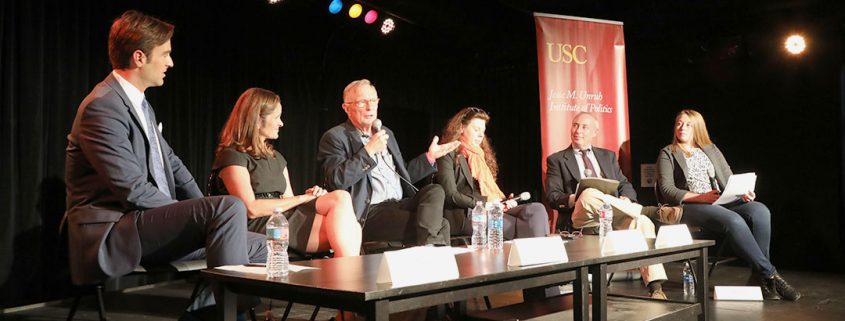Experts discuss money’s role in presidential politics
When Americans turn out to vote for the next President of the United States on Nov. 8, their decision will be influenced by more than just the candidates’ platforms and personalities. They will also make choices affected by the power of money in today’s campaigns, which was the topic of an event hosted by the Jesse M. Unruh Institute of Politics Tuesday night at the Ground Zero Performance Café.
“Can You Buy an Election? The Role and Impact of Money in Presidential Politics” was the fourth installment in the institute’s “Road to the White House” series. Panelists focused on answering the question of why money is important in politics and how it can determine the outcome of elections.
The event was co-sponsored by the USC College Republicans, USC College Democrats and the Daily Trojan. The four panelists featured in the conversation included Republican National Committeeman Shawn Steel, Fundraising Consultant Tracy Austin, Loyola Law School Professor Jessica Levinson and ABC7 reporter Elex Michaelson. The discussion was moderated by Dan Schnur, director of the Unruh Institute, and Julia Poe, features editor at the Daily Trojan.
Levinson noted that although older voters currently receive information from traditional media such as television, the rise of social media and other innovations may, with time, decrease money’s prominence in politics.
“I think it’s going to get less important … because many [young people] use free media, and because if [millennials] decide to show up to vote, you are now the biggest percentage of the electorate, and you can swing potentially every election,” Levinson said. “You could really crater the influence of money.”
Michaelson spoke further about the power of social media to mobilize young people and provide name recognition for candidates who may struggle with fundraising.
“As a member of the media, I think they did a bad job ignoring [Bernie Sanders’s] campaign for a long time, but he was able to harness social media and go around the whole system,” Michaelson said. “He raised money through small donors in an unprecedented way … thanks to a grassroots movement that we’ve never seen before. And the people who don’t check the mail or [use traditional media] all paid attention to Bernie online.”
The panel also considered possible reasons for high voter apathy among young people, which Steel said resulted from a lack of information.
“There’s a good reason why young people don’t vote — they don’t know enough,” Steel said. “They haven’t had experiences. They haven’t been integrated into the world of political information, and for many of them, it’s something they’re not willing to grasp.”
Maddi Eckert, a junior majoring in political science who attended the event, disagreed with Steel’s explanation for the low turnout among millennials.
“I think it’s very closed-minded and uneducated to say that an entire demographic block is uneducated … because this is a major generalization, and it’s a lack of understanding of where we’re coming from,” Eckert said. “While we don’t necessarily watch traditional news outlets, I think I might have access to as much information, if not more, on a daily basis [as older voters], and I know, for me personally, I definitely have greater diversity in the information I digest as well.”
The final two events in the “Road to the White House” series take place on Nov. 1 and Nov. 8, which is Election Day. Next week’s discussion, which will again be held at Ground Zero, focuses on what to look for as the polls come in, while the event on Nov. 8 is an opportunity for students to watch the polls come in live at Wallis Annenberg Hall.

